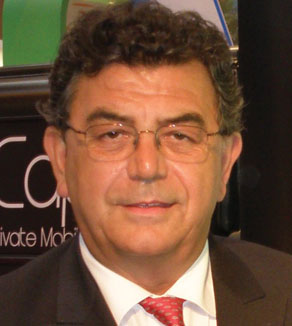The SSR and Executive Profiles annual global salary survey, collects data from more than 4000 security professionals (nationals and expatriates) from the finance, manufacturing, extractives, FMCG, retail and logistics sectors, write Peter French MBE CPP, pictured, and Andrew Hudson.
In 2016 the predicted salary increase for top management roles in the Middle East will be on average 4.5 per cent; this will be above inflation as accommodation costs have reduce dramatically in the region. In our European salary survey earlier in the year we highlighted that wages inflation would average 2.2pc and be broadly spread across all member countries, but the real beneficiaries would be those workers entering the service sector in Germany and the UK from the low cost states of Bulgaria, Romania and Hungary. There is a big push from agencies recruiting excellent English and German speaking workers from these countries.
In the Middle East region we have our own low cost countries that we would usually recruit from the basic trades to middle management openings. As the English speaking students from Bulgaria, Hungary and Romania will, in the main, have better life experiences, the Middle East region has also tapped into those countries for workers with skills and education. In Europe the wage ratio in a geographical radius is from an average of just under 20 euros per hour for workers in the UK to less than two euros in Bulgaria, Romania and Hungary. The latest UK migration figures show that a nett 347,000 people arrived from these countries to settle for work in the UK in the last year. Many are qualifying for SIA licences for security work as vendors seek to increase their margins. In two or three years we will see these workers settle into management roles as, in general, the top 20 security vendors have been good at developing management skills in people. This group of people will challenge for opportunities with the, now largest, UK proportion of population born outside the UK, of just under one million Polish-born that are resident in the UK. The tri-states of Bulgaria, Hungary and Romania seek to imitate the success of the Polish state, and that just might be by taking their jobs in the skilled worker sector of the UK.
The effects of Brexit will not hinder this group, we will just tighten up on the transient under qualified people.
In the private service sector, where innovation is rare, many companies have just cut margins after pressure from procurement professionals, and with cheap labour readily available, they are pushing pay towards, if not already on the minimum wage. Service providers are using these skilled workers to deflate their wage bills to recover their profits.
With a back drop of greater security risks how does the security profession measure its worth?
We are seeing a strong demand for cyber professionals distinctly separate to IT disciplines; focused on employees where according to the CPNI , 84 per cent of attacks are facilitated by the insider. After a period where management sought to reduce back of house costs, outsourcing regardless of the sensitivity of the work to third parties, regulators in the finance sector have made senior management back track and recruit the roles in-house. Edward Snowden, the whistle-blower and former National Security Agency contractor, is possibly the best example on how access oversight, even in the most secret of environments, can be hidden where there are no gate-keepers as the poachers are running the game reserve.
Snowden worked as a Booz Allen Hamilton systems analyst doing contract work for the NSA, he was recognised as a hacker of some repute; the NSA offered him a super hacker role, less money but working for the American eagle. Then he had his epiphany. The documents he revealed detailed secret NSA programmes and capabilities that have been, and continue to be, used to collect and store personal communications both within the US and abroad. Edward Snowden is being courted to come back to the USA after a dramatic turn around by the NSA where he was initially described as a traitor, but in recent high level communiqués, following the reprimand of NSA leadership, it was suggested that perhaps Snowden was “misguided”. Perhaps this is the extreme; security professionals should be managing an holistic range of issues but they need to be risk mitigators understanding the issues and developing cross boarder alliances, be that in the Middle East or across the European Union.
What on average will a regional security director (RSD) manage in resources or influence on corporate spending. Does salary reflect importance or influence? Our survey shows a minimum of 1m US dollars revenue budget but an average of $5m. Capital expense will be influenced by an RSD but key to project managers is that the post holder has relevant knowledge, has the grading to hold their own in a multi-skilled team and their job title is high enough to have vertical respect.
The establishment of the Chartered Security Professionals Register from London is a significant step towards developing a cohort of recognised functional heads of security, who, by experience and education, have delivered to organisations outstanding security practice. This will be the benchmark that organisations will come to rely upon, that they have not attracted a corporate cop but a business manager with whom security risks will be well managed.










